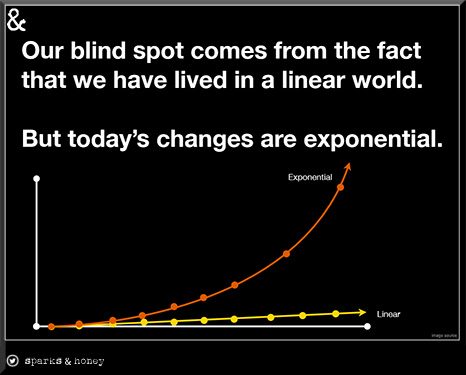Cultures of Perpetual Learning — by Will Richardson
Excerpts (additional emphasis by DSC):
Over the years, we’ve heard a lot of predictions about what the future of work holds for all of us, not just our kids. It’s interesting now to see some of those predictions actually playing out.
Case in point is this post in the Harvard Business Review that summarizes the Herculean change initiative now underway at AT&T. It’s a fascinating read on it’s own, but it’s even more interesting when you start to align some of the findings to the work of schools. Or maybe more daunting.
The biggest takeaway for me? Professional learning is now the responsibility of the learner. I’ve harped on that for a while now, but AT&T pushes that idea in spades.
All of this works within a “culture of perpetual learning.” AT&T employees know that their roles will change, on average, every four years. In other words, if you’re not constantly learning, you’re toast.
From DSC:
Several graphics come to mind (see below).

Rapidly Shifting Technical Demands
For the past three years, AT&T’s CEO, Randall Stephenson, has been making large strategic bets on a diverse range of wireless technologies—most recently the $63 billion acquisition of satellite television company DirecTV. Asked about the decision to venture into new businesses, John Stankey, the head of AT&T’s Entertainment Group, says, “We have no choice.” Customers are demanding constant connectivity; from 2007 to 2015, for example, data traffic on AT&T’s wireless network grew by more than 150,000%. The company forecasts that by 2020, 75% of its network will be controlled by software-defined architecture. That percentage was virtually zero in 2000. This means, says Stankey, that most of AT&T’s global employees “signed up for a deal that is entirely different from the environment in which their business operates today.”











Funny thing is that actually stressing the importance of lifelong learning and creating the whole human model and culture around learning is a Confucian idea, thousands of years back in history. According to him and the school created by those inspired by his works, self-regulated learning is a way of becoming human, constantly working on improving oneself.
I’m wondering whether this approach can be somehow applicable in the new lerning ecosystems in which you are mostly an employee – and Confucius discussed different social roles.
Thanks Nikos for the reflection here. I didn’t realize that was a Confucian idea — thanks.
When you mentioned self-regulated learning, I thought of the word “heutagogy” — https://heutagogycop.wordpress.com/history-of-heutagogy/ — and countless blog postings out there remind me that we all have to keep learning…and to keep learning …and to keep learning…
Daniel
Daniel
Hey Daniel
here, at Wikiquote on Confucius youo have his complete “Analects”. https://en.wikiquote.org/wiki/Confucius
And I wouldn’t suppose that it’s only an accident that the 1st “part of the dialogue” is about learning:
“Isn’t it a pleasure to study and practice what you have learned? Isn’t it also great when friends visit from distant places? If one remains not annoyed when he is not understood by people around him, isn’t he a sage?”
Sometimes I wonder whether in order to create or re-create a kind of learning culture you also mentioned, it wouldn’t be a good idea to start treating Confucius’ ideas as simply contemporary.
However, there’s this question – how should you learn today – do you need to storage information and skills yourself or rather learn only the skill of quickly accessing the resource you need since nearly all of it is stored as data somewhere.
So what kind of lifelong learner do we believe in? According to Confucius, by the process of learning you were becoming a person, a human. Now – ?
and thanks for the link! I wasn’t aware of neither the term nor the blog.
So what kind of lifelong learner do we believe in? According to Confucius, by the process of learning you were becoming a person, a human. Now – ?
Wow…solid question Nikos. We’ll have to see how societies throughout the globe answer that one…as well as the question, “What kind of future do we want?”